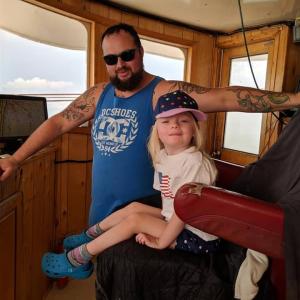Gus Lovgren

Young Fishermen in the Northeast United States
Interviews with 39 fishers between the ages of 18-35, located along the US East Coast from Maine to North Carolina. Collectively, they represent a wide variety of gear types and fisheries. All had been fishing full-time for at least two years and wanted to make fishing their career. They describe motivations for choosing a fishing career, strategies used, barriers encountered, and facilitating factors that have enabled interviewees to defy the graying trend to become successful fishermen.
Please visit the Voices SoundCloud page to explore clips and stories that relate to this collection.
Sarah Schumann
Gus Lovgren, 33 years old at the time of the interview, is a captain and crewmember on the F/V Kailey Ann in Point Pleasant, NJ. Gus is the fourth generation in his family to fish East Coast waters, but maybe not the last: his five-year-old daughter has dreams of carrying on the family legacy, someday.
Scope and Content Note
In the interview, Gus Lovgren discusses his background and experiences as a commercial fisherman. Gus describes how he is a fourth-generation fisherman, and that his family has a long history in the fishing industry, dating back to his ancestors who were fishermen in Sweden, and even during the days of the Vikings. Gus talks about the challenges and rewards of being a commercial fisherman. He explains that the fishing industry is heavily regulated, and there is constant pressure to comply with regulations and quotas. Gus also addresses misconceptions about the fishing industry, particularly regarding bycatch and sustainability. He emphasizes the importance of sustainable fishing practices and the need for collaboration between fishermen and scientists to improve understanding and management.
Gus also talks about his aspirations to become a boat owner and his desire to keep the fishing industry thriving for future generations, including his own children. He touches upon the economic challenges faced by the fishing community, especially with the impact of changing regulations and competition from larger corporations. He also notes the competition they face from foreign and farm-raised seafood, which often lack quality due to the use of chemicals and less stringent regulations. He shares his family's experience in the fishing industry, talking about how his father invested in a new boat with a scallop permit but faced setbacks due to changing regulations. He also discusses his involvement in the Fishermen's Dock Cooperative and advocacy efforts to protect the interests of local fishermen.
"This summer was the first time I brought my oldest daughter out fishing," he recalls. "She absolutely loves it. I want this industry to strive, because if she wants to do this, I want her to be able to. I want her to run a boat one day, if she wants. As of right now, that’s what she wants to do with her life. She says it to me all the time. When we talk about, 'I want to go buy toys,' I say, 'You should do chores.' 'What kind of chores can I do?' 'You can clean up your toys. You can sweep the floor.' 'I don’t want to do that.' 'Well, what do you want to do?' I want to go to work with you.'" In his interview, Gus talks about finding his way back to fishing after completing an architecture degree, despite his father's discouragement. He also talks about being a member of the Point Judith Fishermen's Cooperative, his first trip as a captain, and the tolls that offshore fishings takes on his family life. In the time since this interview was conducted, Gus bought his father's boat and renamed it the Lilly Rose after his daughters.
Please Note: The oral histories in this collection are protected by copyright and have been created for educational, research and personal use as described by the Fair Use Doctrine in the U.S. Copyright law. Please reach out Voices@noaa.gov to let us know how these interviews are being used in your research, project, exhibit, etc. The Voices staff can help provide other useful resources related to your inquiry.
The NOAA mission is to understand and predict changes in climate, weather, oceans, and coasts, to share that knowledge and information with others, and to conserve and manage coastal and marine ecosystems and resources. The Voices Oral History Archives offers public access to a wide range of accounts, including historical materials that are products of their particular times, and may contain offensive language or negative stereotypes.
Voices Oral History Archives does not verify the accuracy of materials submitted to us. The opinions expressed in the interviews are those of the interviewee only. The interviews here have been made available to the public only after the interviewer has confirmed that they have obtained consent.
